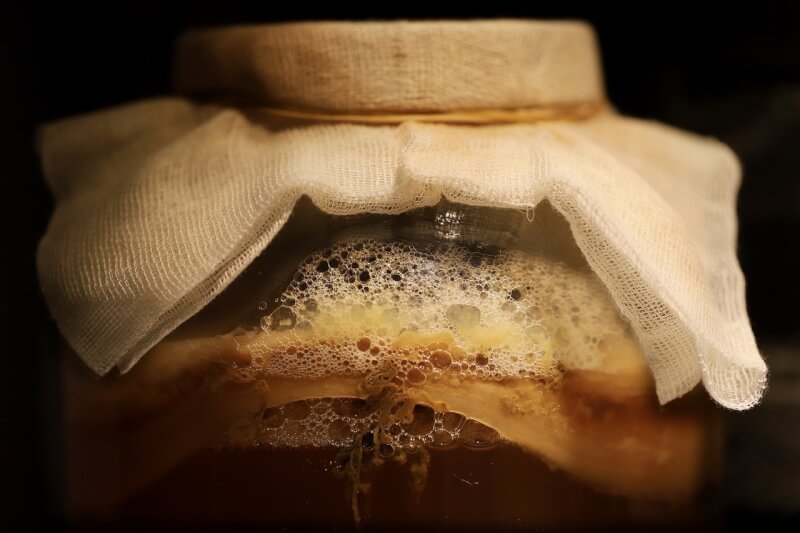Are you feeling overwhelmed and stressed out? We all experience moments when life seems to pile on the pressure. Thankfully, there is a simple and soothing solution right within your reach: brewing a cup of tea. In this article, we will share some helpful tips on how to brew the perfect cup of tea to help you relax and find relief from stress. So grab your favorite tea leaves and get ready to embark on a journey of tranquility and calmness. Let’s discover the art of brewing tea for stress relief together.

Choosing the Right Tea
Understanding the Types of Tea
When it comes to choosing the right tea, it’s important to understand the different types available. There are several types of tea, including black tea, green tea, white tea, oolong tea, and herbal tea. Each type has its own unique characteristics and flavors.
Black tea is a fully oxidized tea that has a rich and robust flavor. It is often enjoyed with milk and sugar, and is known for its energizing properties. Green tea, on the other hand, is unoxidized and has a more delicate flavor. It is often enjoyed without any additives and is known for its numerous health benefits.
White tea is the least processed of all the teas and has a subtle and delicate flavor. Oolong tea is partially oxidized and has a flavor profile that falls between black and green tea. Herbal teas, also known as tisanes, are not made from the tea plant but instead consist of various herbs, fruits, and flowers. They offer a wide range of flavors and are caffeine-free.
Selecting Herbal Teas
Herbal teas are a great option for those who want to avoid caffeine or are looking for different flavor profiles. There are many herbal teas available, each with its own unique benefits. Chamomile tea is known for its calming properties and is often enjoyed before bedtime. Peppermint tea is refreshing and can help soothe digestive issues. Lemon balm tea has a bright and citrusy flavor and can help with relaxation. Lavender tea offers a floral and soothing taste and is often enjoyed for its stress-relieving properties.
Considering Caffeine Levels
It’s important to consider the caffeine levels in tea, especially if you are sensitive to caffeine or looking for a tea to enjoy in the evening. Black and green teas typically contain caffeine, although the amount can vary depending on factors such as brewing time and temperature. White tea generally has lower caffeine levels, while herbal teas are naturally caffeine-free. If you are particularly sensitive to caffeine, you may want to opt for herbal teas or caffeine-free blends.
Quality Tea Brewing Essentials
Using Filtered Water
When brewing tea, it’s important to start with good quality water. Using filtered water can help enhance the flavor of the tea and prevent any unwanted tastes or odors. Tap water can sometimes contain impurities that may affect the taste of your tea, so investing in a water filter or using filtered water from your refrigerator can make a difference in the quality of your brew.
Investing in a Good Tea Kettle
A good tea kettle is an essential tool for brewing tea. Look for a kettle that is made of high-quality materials, such as stainless steel or glass, as this can affect the taste of your tea. A kettle with an easy-to-pour spout and a built-in thermometer or temperature control feature can also be helpful for achieving the perfect brewing temperature.
Choosing the Right Tea Leaves or Bags
The quality of the tea leaves or bags you choose can greatly impact the flavor of your tea. If possible, opt for loose tea leaves instead of tea bags, as they generally offer a better flavor. Loose tea leaves have more room to expand and release their flavors during the brewing process. However, if convenience is a priority, there are many high-quality tea bags available on the market that can still provide a satisfying cup of tea.
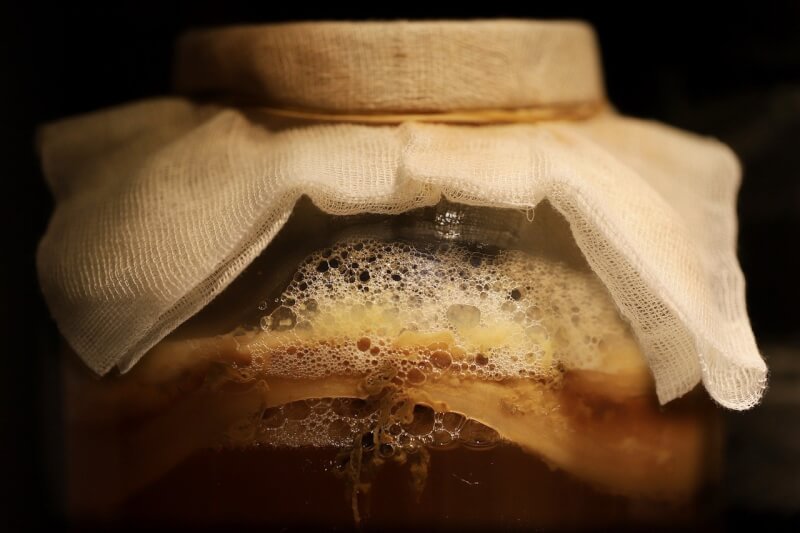
Preparing the Perfect Cup of Tea
Boiling the Water
Proper water temperature is crucial for brewing tea. Different types of tea require different water temperatures to bring out their optimal flavors. As a general guideline, black tea and herbal teas can be brewed with fully boiling water, while green and white teas are best brewed with water that has been brought to a lower temperature, around 175°F to 185°F (79°C to 85°C).
Measuring the Tea
The amount of tea you use can also affect the flavor of your brew. As a starting point, use approximately one teaspoon of loose tea leaves per cup of water. Adjust the amount to your preference for a stronger or more delicate flavor. If using tea bags, follow the instructions on the packaging for the recommended amount per cup.
Steeping Time and Temperature
Steeping time is another important factor in achieving the perfect cup of tea. Different teas require different steeping times, typically ranging from 2 to 5 minutes. Steeping too long can result in a bitter taste, while steeping too short may not bring out the full flavor. It’s best to follow the recommended steeping time for the specific tea you are brewing.
Using a Tea Infuser or Strainer
When brewing loose tea leaves, using a tea infuser or strainer can help keep the leaves contained while allowing the flavors to infuse into the water. Tea infusers are available in various shapes and sizes, allowing you to choose one that suits your preference. If you don’t have a tea infuser, a fine-mesh strainer can also work well.
Proper Brewing Techniques
To ensure the best flavor and aroma, it’s important to follow proper brewing techniques. Start by pre-heating your teapot or cup with hot water, then discard the water before adding the tea leaves or tea bag. Pour the hot water over the tea leaves and allow them to steep for the recommended time. Once the tea is ready, remove the leaves or bag and enjoy your perfect cup of tea.
Experimenting with Ingredients
Adding Fresh Herbs or Spices
One way to enhance the flavor of your tea is by adding fresh herbs or spices. Mint leaves, ginger, cinnamon, and lemongrass are just a few examples of ingredients that can add a delightful twist to your brew. Experiment with different combinations to create your own signature tea blend.
Incorporating Fruits or Citrus Zest
Fruits and citrus zest can bring a burst of freshness to your tea. Adding slices of lemon, orange, or even a handful of berries can give your brew a vibrant and refreshing flavor. You can also try adding a pinch of citrus zest for a subtle citrusy aroma.
Using Sweeteners or Honey
If you prefer a sweeter cup of tea, you can add a touch of sweetener or honey. Opt for natural sweeteners like honey, agave syrup, or stevia to avoid overpowering the delicate flavors of the tea. Adjust the amount to your personal taste preferences.
Trying Different Tea Blends or Combinations
Don’t be afraid to experiment with different tea blends or combinations. Mixing different types of teas can result in unique and interesting flavors. For example, combining black tea with a hint of chamomile can create a calming and fragrant blend. Let your creativity flow and discover new and exciting tea combinations.
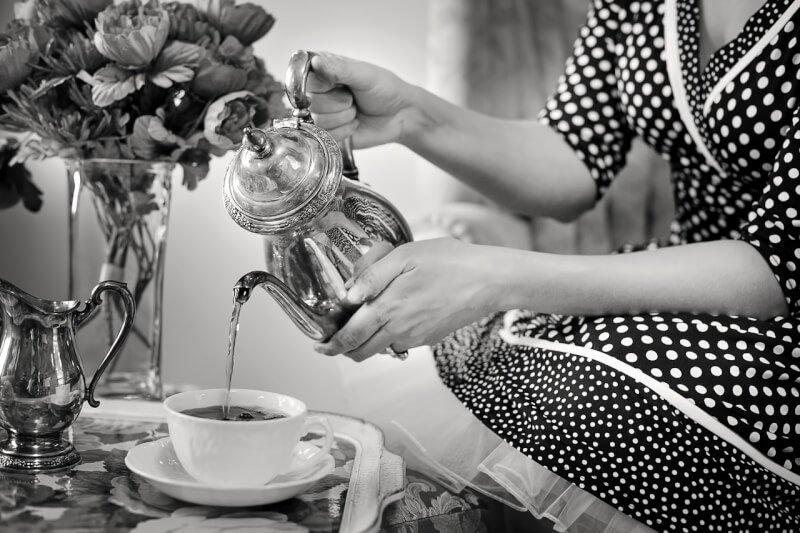
Enhancing the Tea Drinking Experience
Creating a Cozy Tea Ritual
Drinking tea can be a relaxing and enjoyable experience, so why not create a cozy tea ritual? Set aside a dedicated time each day to brew a cup of tea, find a comfortable spot, and savor the moment. Surround yourself with things that bring you joy, such as a favorite mug or a cozy blanket.
Pairing Tea with Relaxing Activities
Tea can be enjoyed on its own or paired with various activities that promote relaxation. Take a few moments to read a book, practice meditation or yoga, or simply sit in silence and allow yourself to unwind while sipping your tea. Pairing tea with calming activities can enhance your overall tea-drinking experience.
Enjoying Tea in a Soothing Environment
Creating a soothing environment can further enhance the enjoyment of your tea. Find a peaceful and quiet space where you can fully immerse yourself in the moment. Dim the lights, play soft music, or light a scented candle to create a calming ambiance.
Using Appropriate Tea Ware
Using the appropriate tea ware can also contribute to a more enjoyable tea experience. Invest in a good quality teapot or tea infuser that suits your personal preference. Choose mugs or cups that feel comfortable to hold and have a shape that allows the aroma to be fully appreciated.
Practicing Mindfulness and Tea Meditation
Mindfulness is the practice of being fully present in the moment and can be incorporated into your tea-drinking routine. Slow down and pay attention to the flavors, aromas, and sensations as you sip your tea. Allow yourself to fully immerse in the experience, letting go of any worries or distractions. Tea meditation can be a wonderful way to find calm and center yourself.
Understanding the Health Benefits
Calming Effects of Tea
Tea has long been associated with relaxation and calmness. Certain teas, such as chamomile and lavender, have natural compounds that can help promote a sense of calm and reduce anxiety. Incorporating these teas into your routine can be a beneficial addition to your self-care practices.
Boosting Cognitive Function
Tea contains antioxidants and compounds that have been shown to support brain health and improve cognitive function. Green tea, in particular, has been studied for its potential to enhance memory and focus. Including green tea in your daily routine can provide a natural boost to your cognitive abilities.
Elevating Mood and Reducing Anxiety
The act of drinking tea itself can be a mood-enhancing experience. Taking the time to relax, savor the flavors, and enjoy the moment can bring a sense of tranquility and happiness. In addition, certain teas, such as lemon balm and passionflower, have been traditionally used for their calming properties and can help reduce anxiety.
Promoting Sleep and Relaxation
Many herbal teas are known for their sleep-promoting properties. Chamomile, lavender, and valerian root teas are often consumed before bedtime to help promote relaxation and a restful night’s sleep. Adding a cup of herbal tea to your evening routine can be a soothing way to wind down and prepare your body for sleep.
Supporting Overall Well-being
Tea is not only a delicious beverage but also a natural source of hydration. Staying well-hydrated is essential for overall well-being, as it helps maintain optimal body function and supports various bodily processes. Choosing tea as a regular part of your beverage choices can contribute to your overall health and wellness.
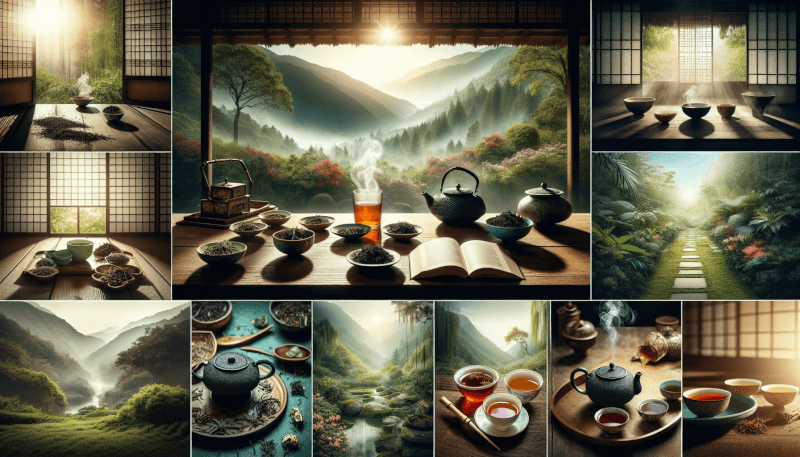
Exploring Different Tea Varieties
Chamomile Tea
Chamomile tea is perhaps one of the most popular herbal teas. It has a mild, floral flavor and is often enjoyed for its calming effects. Chamomile tea is known for its potential to reduce stress, anxiety, and promote better sleep. It can be enjoyed in the evening or at any time when you need to relax and unwind.
Green Tea
Green tea is renowned for its numerous health benefits. It is rich in antioxidants and has been associated with reducing the risk of various diseases, including heart disease and certain types of cancer. Green tea has a delicate and slightly grassy flavor and can be enjoyed both hot and cold.
Peppermint Tea
Peppermint tea is refreshing and invigorating. It has a cooling and minty taste and is often enjoyed for its digestive properties. Peppermint tea can help relieve symptoms of indigestion, bloating, and nausea. It can be enjoyed after meals or whenever you need a refreshing pick-me-up.
Lemon Balm Tea
Lemon balm tea has a bright and citrusy flavor that is both uplifting and soothing. It is known for its calming effects and is often enjoyed to reduce stress and anxiety. Lemon balm tea can be particularly enjoyable in the morning or during stressful moments throughout the day.
Lavender Tea
Lavender tea offers a subtle and floral taste. It is often enjoyed for its relaxing and calming properties, making it a popular choice before bedtime. Lavender tea can help promote better sleep and alleviate feelings of stress and anxiety. Sipping on a warm cup of lavender tea can be a wonderful way to unwind and prepare for a restful night’s sleep.
Passionflower Tea
Passionflower tea is typically enjoyed for its tranquilizing effects. It has a unique and earthy flavor and is known for its potential to reduce anxiety and promote relaxation. Passionflower tea can be enjoyed throughout the day whenever you need a moment of calm and serenity.
Valerian Root Tea
Valerian root tea is often used as a natural remedy for sleep disturbances and insomnia. It has a strong and earthy flavor and is known for its sedative properties. Valerian root tea is best enjoyed in the evening, approximately 30 minutes before bedtime, to help promote a restful night’s sleep.
Storing and Preserving Tea
Proper Tea Storage Containers
To ensure the freshness and flavor of your tea, it’s important to store it properly. Choose airtight containers that can protect the tea from moisture, light, and air. Glass jars with tight-fitting lids or tin containers with inner seals are ideal for tea storage. Avoid storing tea in plastic containers, as they can affect the taste and quality of the tea.
Protecting Tea from Light, Air, and Moisture
Tea is sensitive to light, air, and moisture, which can deteriorate its quality over time. Store your tea in a cool, dry place away from direct sunlight and strong odors. Keep the tea container tightly sealed to prevent exposure to air and moisture. It’s also best to avoid storing tea near spices or other strong-smelling substances, as tea can easily absorb odors.
Avoiding Contamination
To prevent cross-contamination and maintain the purity of your teas, avoid storing different types of tea in the same container. Even trace amounts of one tea can affect the flavor of another. Keep each tea variety separate to ensure their individual flavors remain intact.
Knowing Tea Shelf Life
Different teas have different shelf lives, and it’s important to be aware of how long each type of tea can be stored before it starts to lose its flavor and quality. Generally, black tea, oolong tea, and green tea can be stored for up to two years, while white tea is best consumed within one year. Herbal teas, which do not contain tea leaves, can also be stored for up to two years. However, it’s worth noting that the flavor and quality of tea can gradually decline over time, so it’s best to consume teas as fresh as possible.
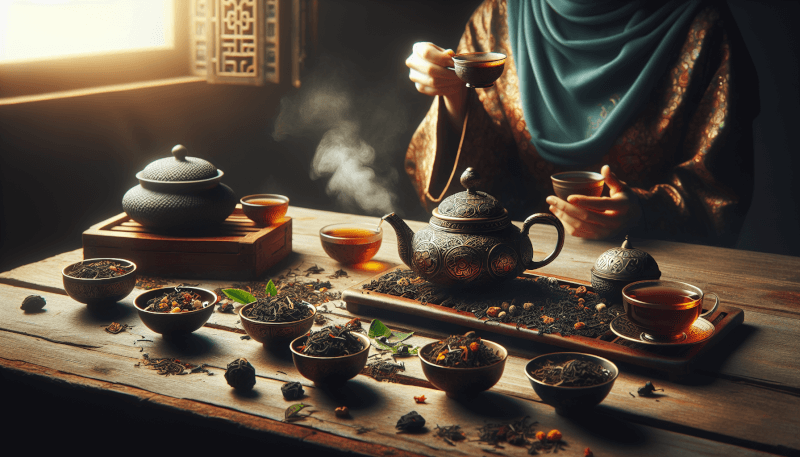
Finding Your Personal Tea Preferences
Exploring Different Flavor Profiles
Tea is a versatile beverage with a wide range of flavor profiles. From the earthy notes of oolong tea to the floral aroma of jasmine tea, there is a tea to suit every taste preference. Experiment with different types of tea to discover the flavors that resonate with you. Pay attention to the nuances in taste and aroma, and let your senses guide you in finding your preferred tea profile.
Experimenting with Preparation Styles
The way you prepare your tea can greatly influence its flavor. Try different brewing techniques, such as steeping times and temperatures, to find the best balance for your taste buds. Some teas may taste better when brewed at a lower temperature for a shorter time, while others may benefit from a longer steeping period. Take notes on each brewing method to keep track of your preferences.
Noting the Effects of Different Teas on Your Stress Levels
Tea can have different effects on individuals, and it’s important to observe how different teas make you feel. Some teas, such as chamomile or lavender, may have a more calming effect, while others, like green tea, may provide a gentle boost of energy. Pay attention to how different teas affect your stress levels and overall well-being to pinpoint the teas that work best for you.
Keeping a Tea Journal
Keeping a tea journal can be a fun and helpful way to explore different teas and document your preferences. Record the type of tea, brewing techniques, and your personal observations regarding taste, aroma, and effects. Over time, you’ll have a useful reference to refer back to and create your own tea library.
Consulting a Tea Expert or Herbalist
Seeking Professional Advice
If you’re interested in delving deeper into the world of tea, seeking advice from a tea expert or herbalist can be valuable. They can provide guidance on the different types of tea, optimal brewing techniques, and even suggest teas that may suit your specific needs or preferences. Their expertise can help you expand your tea knowledge and enhance your tea experiences.
Understanding Potential Interactions or Allergies
Tea, like any other substance, can have potential interactions with medications or allergies. If you have any underlying health conditions or take prescribed medications, it’s important to consult with a healthcare professional or tea expert who can provide appropriate advice. They can help you navigate any potential interactions or allergies and recommend teas that are safe for you to consume.
Customizing Tea Recipes for Your Needs
Tea can be customized to suit individual needs or preferences. Working with a tea expert or herbalist can help you create personalized tea blends or recipes that target specific health concerns or desired benefits. Whether it’s promoting relaxation, improving digestion, or boosting your immune system, a professional can help guide you in creating tailored tea recipes.
In conclusion, choosing the right tea involves understanding the different types available, considering caffeine levels, and selecting herbal teas for specific needs. Quality tea brewing essentials such as using filtered water, investing in a good tea kettle, and choosing the right tea leaves or bags are important for a satisfying cup of tea. Proper brewing techniques, experimenting with ingredients, enhancing the tea drinking experience, and understanding the health benefits can further enhance your tea enjoyment. Exploring different tea varieties, storing and preserving tea, finding your personal tea preferences, and consulting a tea expert or herbalist can help you fully explore the world of tea and create a tea ritual that brings comfort and relaxation into your life. Remember to take the time to savor each sip, knowing that tea can be much more than just a warm beverage – it can be a moment of tranquility and self-care in your daily routine.

